|
|
|
Sort Order |
|
|
|
Items / Page
|
|
|
|
|
|
|
| Srl | Item |
| 1 |
ID:
168279


|
|
|
|
|
| Summary/Abstract |
When do private creditors versus debtor states accept a greater burden in resolving sovereign debt crises? In this study, we argue that distributive politics helps explain the “haircut”—or losses—private creditors take in debt restructuring cases. Despite the expected convergence of partisan policies in a globalized economy, we argue that right and left leaders extract different settlements in debt negotiations. Left governments, representing constituents most likely to be hurt from higher debt repayment, credibly demonstrate more bargaining power and extract greater concessions from creditors. Distributive politics, however, is an indeterminate factor in explaining states entrance into debt negotiations. We use recently released data on the outcome of sovereign debt restructuring cases between states and private creditors from 1975 to 2013 to test our expectations. Results from a double-hurdle model indicate that creditors receive a larger haircut when negotiating with left governments.
|
|
|
|
|
|
|
|
|
|
|
|
|
|
|
|
| 2 |
ID:
133713
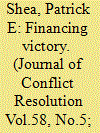

|
|
|
|
|
| Publication |
2014.
|
| Summary/Abstract |
With access to inexpensive credit, states can finance wars without overburdening their constituents, and face relatively small short-term costs compared to states with poor credit access. As a result of these economic benefits, states with lower credit costs will be more likely to win their wars, ceteris paribus. However, lower borrowing costs provide states domestic political benefits, which I argue are more important for democracies than nondemocracies. Since expensive credit forces states to rely on its citizens for revenue, governments that are more sensitive to their citizens' preferences are at a disadvantage. In sum, I argue that democracies are more sensitive to credit costs than authoritarian regimes. To test this theory, this article analyzes a data set of wars using logistic regressions and matching techniques, and examines the case of the Chaco War. The results demonstrate that the costs of borrowing have a substantial effect on war outcomes, and that these costs are more important for democracies than nondemocracies.
|
|
|
|
|
|
|
|
|
|
|
|
|
|
|
|
| 3 |
ID:
141234
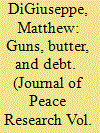

|
|
|
|
|
| Summary/Abstract |
I argue that favorable access to sovereign credit provides governments with greater autonomy to invest in security by allowing political incumbents to relax fixed-budget constraints. Borrowing permits leaders to delay and minimize the macroeconomic and redistributive costs associated with domestic sources of finance. Consequently, leaders of creditworthy states face fewer political costs when increasing military expenditure in response to growing demand or maintaining military expenditure when government revenues fall. A cross-sectional time-series analysis supports two observable implications of the argument. First, creditworthiness is positively associated with military spending with an effect on par with regime type. Second, creditworthiness conditions the effect of external threats on military expenditure, suggesting that poor credit terms constrain the provision of security.
|
|
|
|
|
|
|
|
|
|
|
|
|
|
|
|
| 4 |
ID:
141853
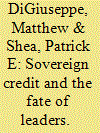

|
|
|
|
|
| Summary/Abstract |
In this article, we contend that the “democratic advantage” literature (i) exaggerates the potential political backlash from credit downgrades in democracies; and (ii) overlooks the importance of sovereign credit to nondemocratic leaders. We argue that nondemocratic regimes receive a higher marginal political benefit from credit compared to democratic regimes. Consequently, changes in credit prices or credit access affect nondemocratic leaders' tenure more than democratic leaders' tenure. To test this argument, we provide the first statistical examination of the electoral punishment mechanism of the “democratic advantage.” Our duration analysis shows that credit downgrades increase nondemocratic leaders' vulnerability more than that of their democratic peers. Our research reinforces the growing concerns about the conventional views about regime type, domestic constraints, and leaders' preferences toward sovereign credit and other political processes.
|
|
|
|
|
|
|
|
|
|
|
|
|
|
|
|
| 5 |
ID:
142497
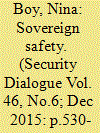

|
|
|
|
|
| Summary/Abstract |
This article traces the contours of an inconspicuous kind of state power in the form of sovereign safety. This power is articulated, more precisely, in a combination of four elements: the historical term of public credit, the liquid government bond, the risk-free asset of financial textbooks and the safe-haven function assumed by the bond market in times of uncertainty. All of these involve a peculiar translation from sovereign debt as the most risky asset to sovereign creditworthiness, circulating unsecured. If critical security studies has largely limited itself to a critique of the relatively recent sense of political state security, this article explores the relevance of a far older financial sense of ‘security’ and ‘securitization’ for contemporary studies of security. So far, the Foucault-inspired finance–security literature has emphasized the risk calculus as a principal mechanism in ‘securing circulation’. This article argues that sovereign safety constitutes an important overlooked factor in securing circulation in two ways: As the main form of collateral for financial transactions, its capacity to secure derives from being considered secure itself. As an epistemic variable, it constitutes the bedrock of modern finance theory. Moreover, rather than neatly complementary to the liberal security dispositif, sovereign safety can to some extent be said to represent the very object of the Foucaultian divesture of power.
|
|
|
|
|
|
|
|
|
|
|
|
|
|
|
|
| 6 |
ID:
161602
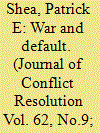

|
|
|
|
|
| Summary/Abstract |
Sovereign borrowing is often used to cover the costs of war. This borrowing, coupled with war’s economic disruptions, strains states’ ability to honor debt promises. Contrary to conventional expectations, however, we find that default is not common after wars. To explain the relationship between war and sovereign default, this article lays out a selection effect argument: war participants are unlikely to default in the first place, while states likely to default are unable to acquire the financing necessary to fight a war. In sum, states that lack the financial means to adequately borrow avoid paths to war. After offering some examples of the selection mechanism at work, we present evidence that states unlikely to default will avoid entering the war sample. Our findings have implications for the inferences researchers make about war finance and war onset.
|
|
|
|
|
|
|
|
|
|
|
|
|
|
|
|
|
|
|
|
|